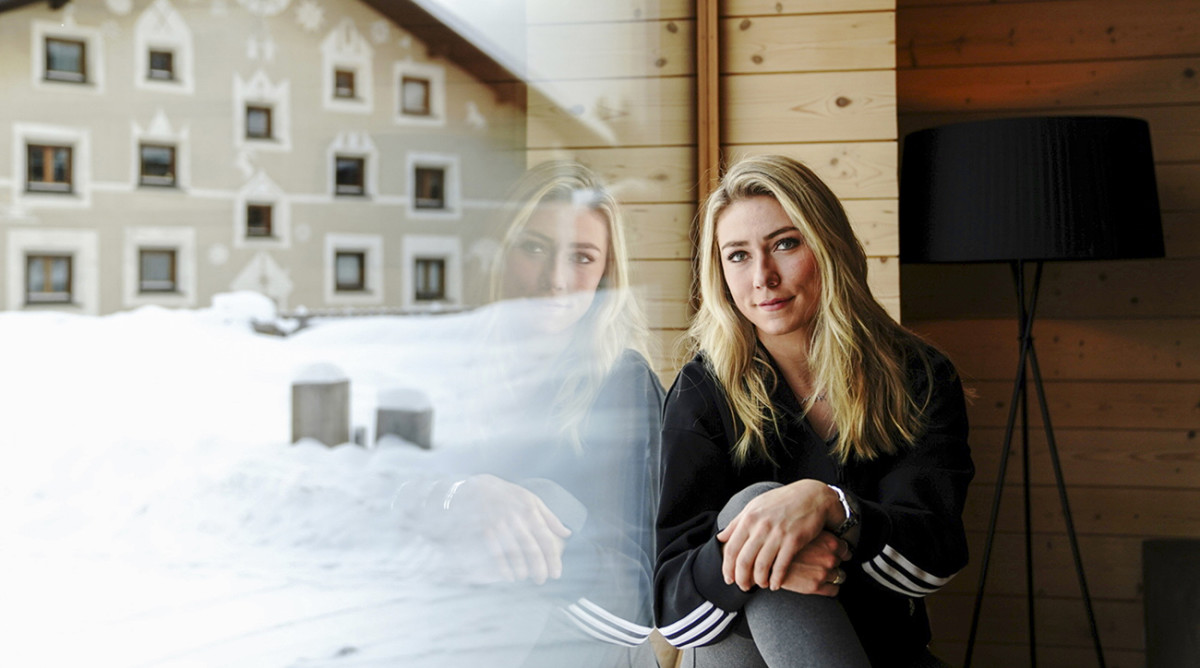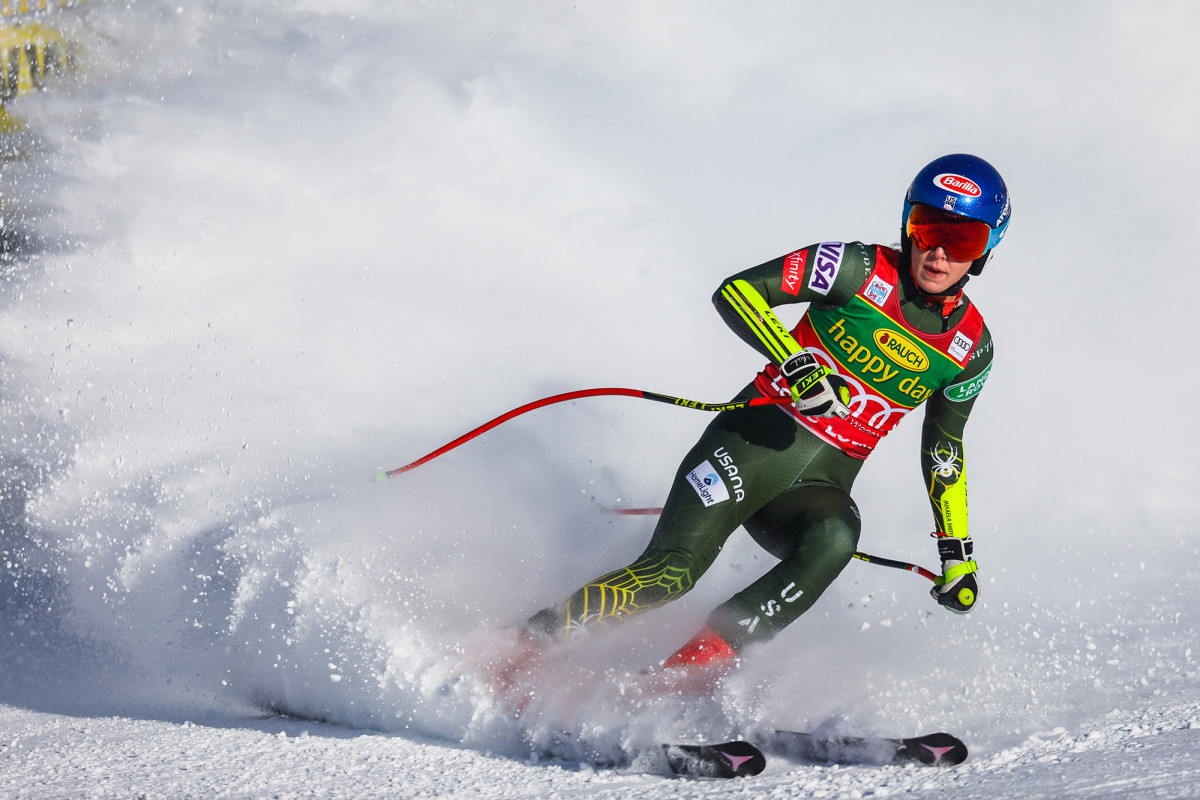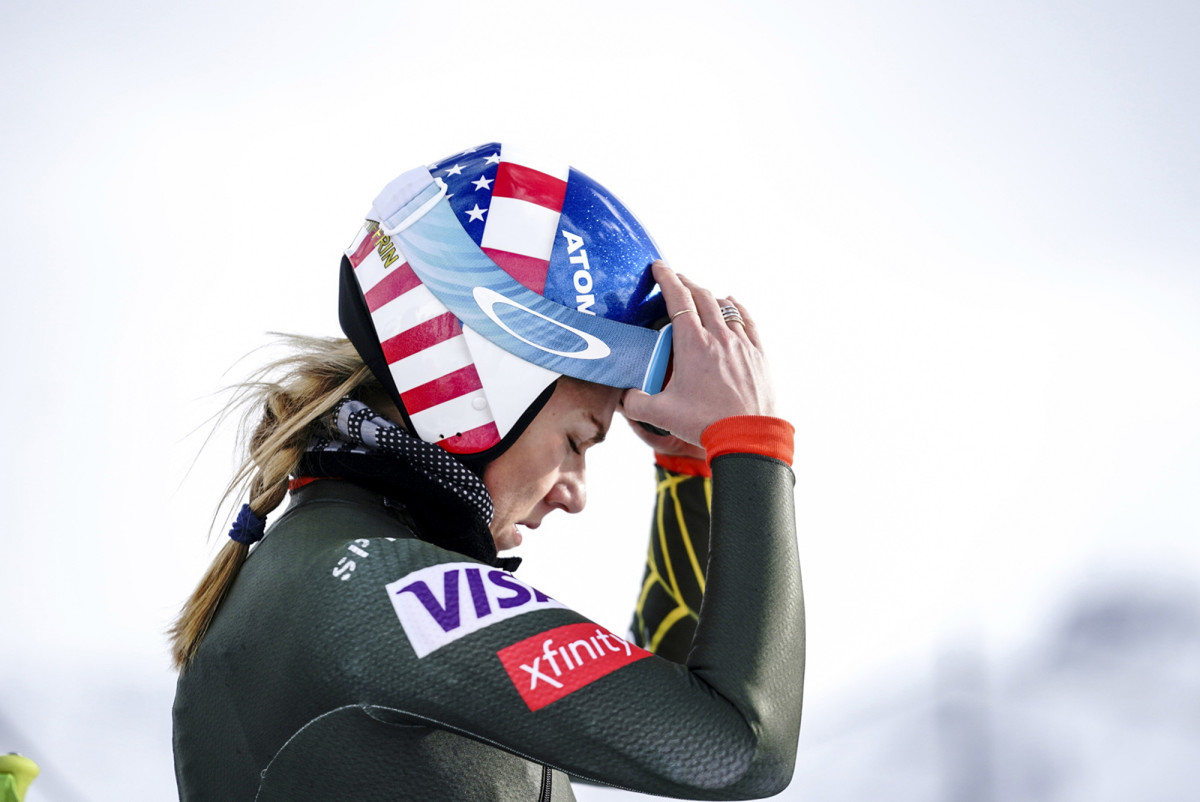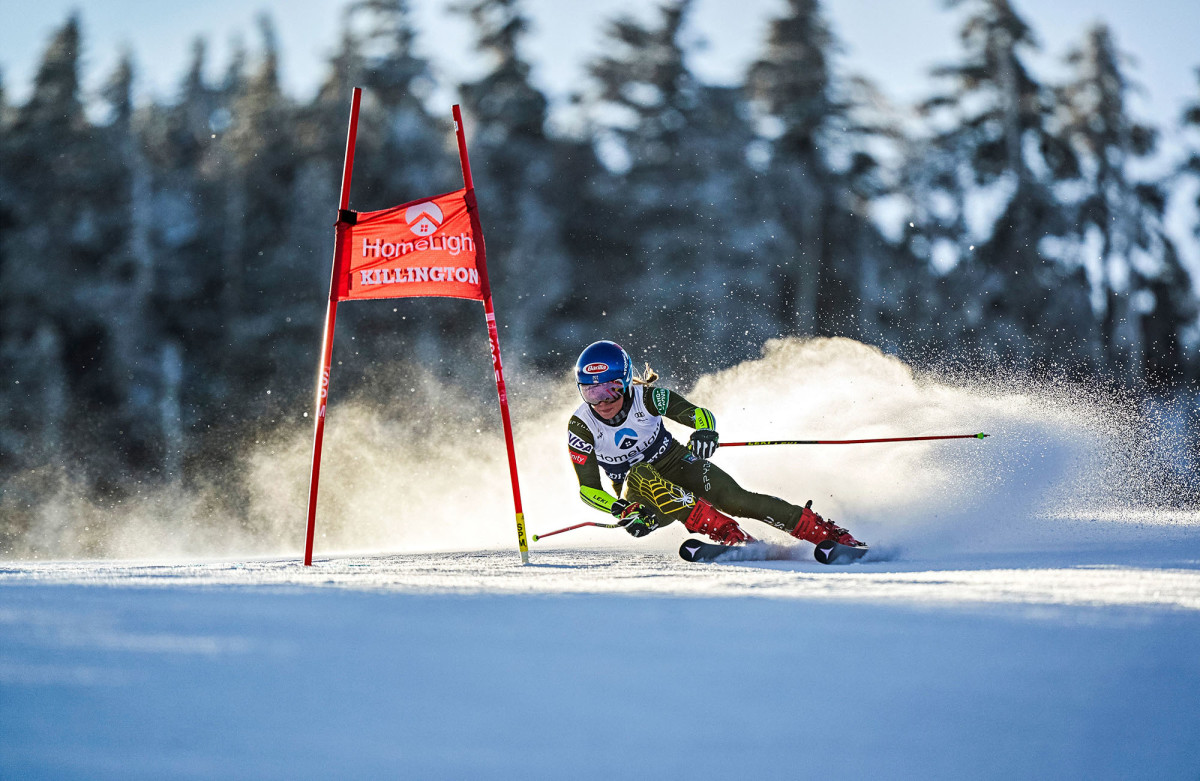Mikaela Shiffrin Is Finding Her Way Back After a Nightmarish Year
Late into the worst year of her life, Mikaela Shiffrin began planning an overseas Thanksgiving dinner. Despite everything—the death of her beloved father, the interruption of her march into ski racing and sports history, the global pandemic, the severe back injury—she realized she still had much to be thankful for. More than most, in fact. If only she could, once again, summon the strength.
She made, froze and packed various sauces into her luggage, next to her race skis, which had not been used in World Cup competition for more than 300 days. She picked a secluded apartment in an undisclosed European locale. She hoped to find some sort of turkey—or even chicken breast—to pair with the homemade stuffing she planned to make with her mother, Eileen Shiffrin. And both decided they would toast to Jeff Shiffrin—Eileen’s husband, Mikaela’s father, a solver of problems, reader of x-rays, caretaker of water softener systems and photographer of all the most important moments. The man who saw life like a Rubik’s Cube, fixable regardless of the starting combination, who both had missed terribly since the tragic accident he suffered while working at home in the Colorado mountains in early February.
“We’re going to eat,” Mikaela says on the phone from Europe. “We’re going to make the most of it.”

Going to make the most of it. Story of her year; this strange, trying, impactful, horrible, meaningful year; this grieve-and-train-and-ski-and-rehab, try-to-make-sense-of-what-no-longer-does year. Shiffrin didn’t consider retirement, not exactly. She did spent hours debating—with her mom, in her own head—the risks and rewards of the life she long ago had chosen. Sure, there was fame and celebrity and money and endorsements. But she also lived an intense, monotonous existence, basically from childhood. She says she can’t take a half-hearted approach to her career or her comeback—her dad would “never have allowed or respected that.”
The question that would come to define her 2020 was: if not a half-hearted approach, then how about a broken-hearted one? Sometimes, she didn’t want to ski. Most days, she doesn’t “really want to be anything. I just want to go to bed and not really care.” And yet, Shiffrin does care, as much as any athlete can, about her sport and her career and her legacy. If anything, as she won 66 World Cup races at an astronomical pace, faster than anyone in the history of ski racing, she cared too much.
She cared about making her parents proud. They had met on ski slopes, the Shiffrins. Of course they had. They taught Mikaela and her brother, Taylor, the family craft as soon as the kids could stand. Mikaela made her World Cup debut at age 15, won five world championships and three Olympic medals and more races than all but three humans who had ever stood atop a mountain and decided to do the most remarkable thing: fly straight down.
Her mom came to handle the World Cup logistics; her father, he took care of everything else, right up until the end. As an anesthesiologist, he helped Mikaela find the right treatments and recovery timetables. As an eternal deal-seeker, he booked all the family travel. As an amateur handyman, there was no household fix he ran away from. If Mikaela needed anything—a hug, a ream of research on a new technique, celebratory photos from her races—Jeff was there. When Eileen’s mother, Mikaela’s beloved Nana, died in 2019, Jeff was there. When the pressure to live up to her own staggering standards felt like too much, Jeff was there. When she needed to focus, needed to laugh, needed to take an afternoon off and go see a movie, Jeff was there. “I don’t know how to survive without him,” Mikaela says. “He was our safety net.”
She used to tell her father all the time that she wanted to learn his vast array of wide-ranging knowledge. Whenever they could find time, they’d tell each other.

Now, she’s learning, because she has to, with Eileen, as always, by her side. For instance, a few weeks back, they noticed that the water in the Colorado house didn’t taste right, that the taps were leaving behind residue. That led down a rabbit hole of YouTube videos and Google searches, research into sodium vs. potassium and much consideration over the proper way to fix the water softener without ruining the brine pump. This is their life now. Meanwhile, Mikaela asks what any 25-year-old would ask, what most 55-year-olds would ask: What, exactly, is a brine pump?
Jeff Shiffrin knew how to clean out the HVAC system. He knew how to fix the spa, how to maintain the solar panels, pay the bills, check the plumbing. He made sure that Mikaela’s phone was paid for, that she had one for her European travels and another for when she was home in the United States. These might seem like small things. But the totality of her father’s impact cannot be overstated. Worse yet, because of the public nature of his death, her family dealt with several attempts of identity theft in the aftermath. “All these things,” she says, “they just pile on.”
“It felt,” she says, “literally like a matter of survival.”
Where before, she would spend weeks on end training, preparing for another World Cup season full of titles, Shiffrin devoted this spring and summer to studying to become the CEO of what’s basically a major corporation: herself. She added in workouts here and there to maintain her strength. All while grieving, day after day.
Not to mention the pandemic that shut down her comeback before she could start racing again in March. Jeff would have known what to do, would have read for hours on vaccines and studied logistics and projected a strength that Mikaela never quite felt inside.
Weeks passed. Then months. The Shiffrins had given themselves a self-imposed deadline of September, to, Mikaela says, “get our lives in order.” The deadline came and went. Until, eventually, gradually, Shiffrin desired to ski competitively again. Most years, she might have trained for something like 60 days on snow before heading to Europe to start the season. This year, between all the logistical headaches, thwarting identity theft, sorting through her grief and supporting her mom and brother, she managed only 24 days of training on the mountain—and that felt like a lot, even if her competitors had not missed afternoon.

She flew to Europe last month, still uncertain, still traumatized, and after only a few days of training she threw out her back. She wanted to send her father the MRI scans. She couldn’t race. She couldn’t train. Another comeback, foiled. “I just wanted to push out of the start gate,” she says. “I didn’t even want to win.”
Fast forward to Nov. 21. Levi, Finland. Nine months after her father’s death; one year, roughly, after her Nana passed away. Her first actual race since Jan. 26, before the world changed, before her world changed. Shiffrin climbed into a starting gate last week, for a slalom race, and she tried to focus on her strategy, the turns ahead. She needed to compartmentalize, to separate what she had to do from all that she had overcome. Then, off she went, to do what she does better than anyone on the planet. She felt everything: amazed, thrilled, satisfied and, of course, sad. That she finished second didn’t matter. Her father? He would have been standing at the bottom of the course, camera in hand, proud as all hell and shouting in celebration.
As mother and daughter drove through Europe, alone, they thought about the man they had lost in February. How they would have called him whenever they got lost. How he might have flown over to spend the holidays with them. “It’s like every single thing that we do is just going to remind us of something that we’re going to be missing for the rest of our lives,” Mikaela says, her voice wistful. She pauses for what seems like a minute. “At some point, you start to see those things with an appreciation,” she says. “Right now, it’s just really sad.”
The events of the past year—much as she would have preferred not to live through them—did change her and how she looks at her career. She wonders sometimes now why she used to be so worried, why she thought that losing a race was the worst thing that could ever happen to her. Until the worst thing did.

Sometimes, now, when Mikaela and Eileen are traversing far away continents, lugging eight huge bags full of ski equipment, the wrath of COVID-19 never far away, something unexpected will happen. The kind of travel snafu that Jeff would have fixed, that drives them crazy, until they begin to laugh so hard that they begin to cry. Jeff used to tell them that no job, no life, was perfect. That being imperfect, even for a ski racer who wins as often as Mikaela, was not just OK. That was life.
“I’m the same person,” she says. “I can still ski fast.”
Of course. And yet, she’s different, too. Because of her father and what he taught her and the lessons her mom continues to impart and the best friend who checks in most days and everyone else who lends support. Yes, Mikaela saw a recent article about herself, one that posited that “bad things keep happening” in her life. And, yes, sometimes it feels that way. But there is much to be thankful for on this Thanksgiving, whether carving turkey or some sort of chicken breast from random market in some European town.
“This might be the most grateful Thanksgiving we’ve had,” Shiffrin says, sounding less like an athlete as dominant as any on the planet, and more like a daughter who lost her dad but not the lessons he imparted. The ones she needs now, more than ever.
